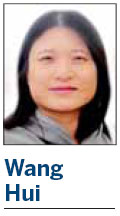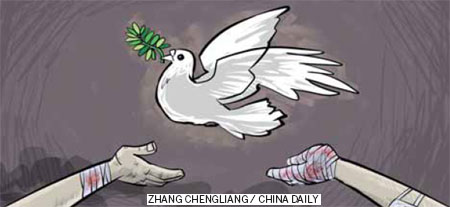Sitting around a table beats holding a gun
Updated: 2014-01-31 06:41
By Wang Hui (China Daily Europe)
|
|||||||||||
China's stance on finding a solution to the Syrian crisis has been vindicated
The international conference on Syria that opened in Montreux, Switzerland, on Jan 22 rekindled a ray of hope for a political resolution to the long-running conflict in Syria. Both opportunities and challenges lie ahead for resolving the three-year bloodshed and violence, and the world has every reason to continue to build on the current hard-won momentum and ensure dialogue and negotiations between the warring Syrian parties continue.
Given the complexity of the crisis and the deep hatred between them, the start of the conference on schedule itself marks a significant step in international mediation efforts. Though representatives from the Syrian government and the opposition used the opportunity to exchange angry words, and even threatened to walk out in Geneva on Jan 25, they sat down in the same room and talked with each other face to face for the first time since the crisis broke out in 2011. Even for those pessimistic about Syria's future, this is a significant development, if not a major breakthrough.
Direct talks between the two sides continued on Jan 26 and yielded initial results as the two sides reached a limited agreement to let women and children leave one besieged city. United Nations mediator Lakhdar Brahimi said the two sides were expected to issue some general statements on how to proceed following their negotiations on Jan 27.
So what the Geneva II conference has achieved so far deserves praise for simply reaching this point. Finding a political resolution to the Syria crisis is a painstaking process. Flexibility and patience are key if representatives from about 40 countries and international organizations gathered in Geneva want the conference to make progress.

There is a world of difference between the warring sides. The role of President Bashar al-Assad was the real focus of their dispute. While the opposition insists that he has no role in a transitional government, the government refuses to countenance any transfer of power.
As Chinese Foreign Minister Wang Yi has rightfully put it, as long as negotiations continue, with dialogue deepening and trust growing between the two sides, all issues should and can be resolved. Addressing the conference on Jan 22, Wang suggested the two sides start with smaller issues. The developments that followed later in the week proved China's suggestion was the right way to proceed.
On Jan 24, the peace conference almost collapsed, and was only saved after Brahimi persuaded the two sides to focus on smaller issues on which agreement might emerge. The tentative agreement reached on Jan 26 was a good starting point. As long as both sides keep talking, there is always a chance for them to bridge the gaps.
China's stance on the Syrian issue has gained increasing support around the world. As a permanent member of the UN Security Council, it is willing to play a role in safeguarding world peace and regional stability. On the Syrian issue, China has always upheld its principles and approached the issue from the interests of the Syrian people and those of the region.
The Geneva II conference is evidence that seeking a political resolution to the crisis has triumphed over militarism. This momentum should be maintained until a solution acceptable to both parties is found.
The civil war has claimed more than 130,000 lives, displaced more than 6 million and impoverished nearly half of the country's 23 million inhabitants. The war has dealt a heavy blow to the country's economy.
Worse, the spillover of the crisis has spread gloom for the region's security outlook. With the crisis exacerbating, extremists and terrorist groups have taken advantage of the chaotic situation to reorganize and expand their sphere of influence.
Apparently, it serves neither parties' interests if this worrying picture, which worsens each passing day, is allowed to continue. It is beyond doubt that a political resolution to the Syria crisis is imperative.
For the Geneva II conference to yield substantial results, it is crucial that major players at the conference find convergence of interests and push for negotiations in issues such as a partial ceasefire and humanitarian relief efforts.
The world should encourage the participation of all political forces committed to political resolutions to the crisis. Major regional players should also reconsider their policies of arming Syrian opposition forces.
The author is a senior writer with China Daily. Contact the writer at wanghui@chinadaily.com.cn

(China Daily European Weekly 01/31/2014 page13)
Today's Top News
Trade frictions with the EU likely to grow
Xi, Putin vow stronger ties
Pollution dampens fireworks sale
US warns airlines about 'toothpaste bombs'
Dutch security services bug phones
President Xi leaves for Sochi ceremony
Vatican's child abuse record slammed
Schroeder accuses US of disrespect
Hot Topics
Lunar probe , China growth forecasts, Emission rules get tougher, China seen through 'colored lens', International board,
Editor's Picks

|

|

|

|

|

|





